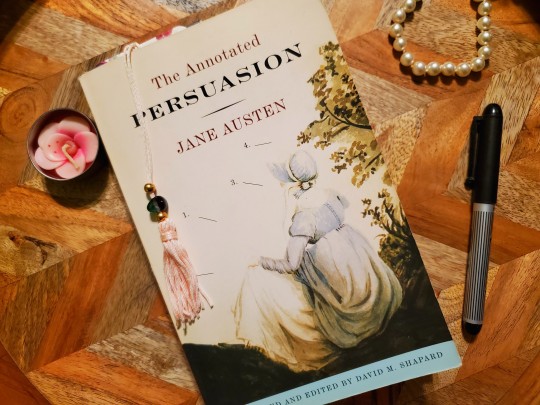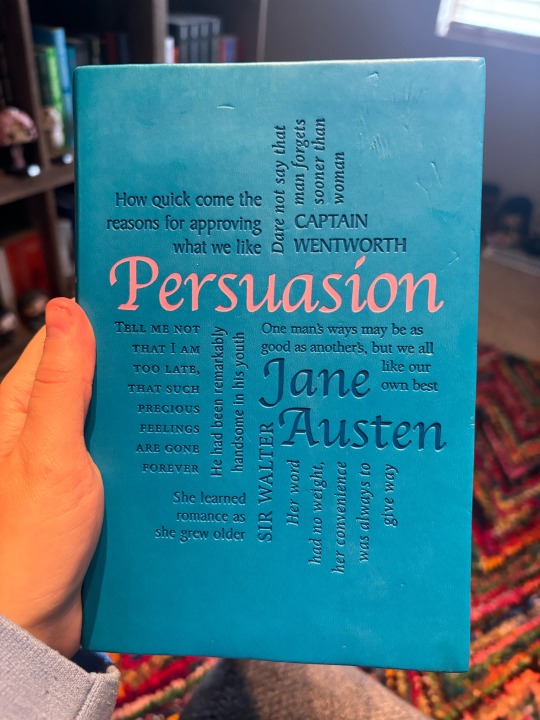#persuasion reread
Text
And another thing: Captain Wentworth is kind. In the chapters where Austen introduces him, and reintroduces him to Anne, this is one of the things she is sure to make clear. He is solicitous of a sick and injured child, and far more sensitive to the genuine needs (as well as the respectability) of a household’s domestic routines than many a man might be, let alone an unmarried one. In a gathering where it is taken for granted that Anne will make herself useful by playing the piano, he wants to know if she might want to dance herself. And perhaps most signally, at a party where Anne reflects that he might easily be spoiled by the universal and eager admiration of marriageable young ladies, he extracts himself from general conversation in order to listen and talk to good-hearted, faintly ridiculous Mrs. Musgrove about the son whom he knew and whom she mourns.
#persuasion reread#*cries about it*#frederick 'unconsciously nay unintentionally constant' wentworth everyone#persuasion#jane austen#will not let us REST
1K notes
·
View notes
Text
Making my female relatives suffer with me by suggesting Persuasion for our July book club reading and watching the new Netflix adaptation with them so I can have someone irl to rant with
9 notes
·
View notes
Text


“A few years before, Anne Elliot had been a very pretty girl, but her bloom had vanished early; and as even in its height, her father had found little to admire in her, (so totally different were her delicate features and mild dark eyes from his own), there could be nothing in them, now that she was faded and thin, to excite his esteem. He had never indulged much hope, he had now none, of ever reading her name in any other page of his favourite work.”
― Jane Austen, Persuasion
#The Annotated Persuasion#Persuasion#Jane Austen#David M. Shapard#books#book photography#book haul#book mail#maybe i ordered this is 2023 but its january arrival means i didn't lie above my absolutely last book haul post#im so excited to reread this#hmmm in fact im ignoring the fact i have 8 books going and starting this now#so#current reading#Not out of void but out of chaos
52 notes
·
View notes
Text









#moodboard for spending your Friday night rereading persuasion I guess lmao#I'm soooo normal about this book#persuasion#jane austen#mp
103 notes
·
View notes
Text
Some Underrated Things In Jane Austen's Novels:
Catherine Morland's arc of learning how the world really works while showing that her innocence and honesty are good, worthwhile things
Henry Tilney's arc of overcoming cynicism and learning how to finally stand up to his abusive father
Mrs. Jennings, the vulgar and embarrassing but kind and generous woman
Elinor and Colonel Brandon's friendship
Marianne teasing Edward
Charles Bingley: the Ideal Gentleman who is kind, generous, friendly, and smart, whose only flaw is that he's too willing to give people the benefit of the doubt and thus doubts his judgement sometimes
Fanny Price: The Strongest Female Character in all of Austen
Anne Elliot's and Charles Musgrove's friendship. Actually, the way that all the Musgroves appreciate Anne and she enjoys their company
The deep friendship between Wentworth, Harville and Benwick
#there should be more but the things most coming to mind are the books i've reread most recently#tl;dr anything that's *not* directly related to a main romance and/or things that have been skewed by adaptations or fandom#jane austen#persuasion#pride and prejudice#sense and sensibility#northanger abbey#mansfield park
827 notes
·
View notes
Text
"Persuasion is Austen's saddest and most impassioned novel, and in its blend of the public and the personal it explores both the anguish of silence and the value of hope."
Persuasion: An Annotated Edition, Introduction by Robert Morrison
525 notes
·
View notes
Text

not me getting emotional over this card then proceeding to reread this part of the book only to be reminded that it’s elizabeth’s card 😅
#amanda reads#persuasion#listen it was an honest mistake okay#i was like damn this is so cute#but i didn’t remember the context#so i decided to reread it#and then boom disappointment#🥲#you guys remember this book right?#it’s that edition with all of the letters
21 notes
·
View notes
Text
unpopular opinion but I don't think pride & prejudice is jason's favourite book. I think he loves it. I think it's a comfort read that makes him think of easier times. I think he thinks austen is fucking hilarious (with alfred as an influence, ofc he considers that english character the height of humour). I think he loves lizzy but the character that lingers in his mind the longest after a reread is lydia. I think darcy reminds him of bruce. but I don't think it's his favourite.
#idk what his MOST favourite book is yet... maybe he doesn't have just one. i certainly can't choose mine lol#hell get back to me when i've read the rest of austen's novels. p&p might not even be his favourite among those#certainly the most reread but i could easily make an argument for persuasion which is the other one i read this year#talking to the void#my thoughts#dc#dc thoughts#jason todd
14 notes
·
View notes
Text
everyone has been saying this for literally more than 200 years but…Jane Austen rules
#got to the ‘accomplished woman’ scene in my p&p reread#it’s just so perfect#i think it’s been a long time since i reread this one#i’m more likely to pick up persuasion or s&s#but lizzy bennet is a classic heroine for a reason#personal
4 notes
·
View notes
Text
Persuasion: The Paperwork Problem
I am obsessed with the fact that Captain Wentworth does Mrs. Smith’s paperwork for her, and not just because having a male romantic protagonist do paperwork as part of demonstrating his ultimate worthiness (and swoon-worthiness) proves that no one is doing it like Jane Austen. No, I am obsessed with it because Britain’s transatlantic economy is in flux in the early nineteenth century. And because this Persuasion reread has convinced me that Austen does everything in this novel on purpose to make me suffer. Here is my theory: what Wentworth is doing is divesting from slavery. What? you may exclaim, gentle readers, and I am here to lay evidence for my tenuous little theory before you.
Point 1: Wentworth’s behavior here is explicitly contrasted with that of Mrs. Smith’s wastrel husband. These are alternate models of masculinity. And Mrs. Smith’s narrative for Anne very clearly links not only the late Mr. Smith’s moral corruption with his mismanagement of this property, but also Mr. Elliot’s lack of moral backbone with his failure to manage it for her. And this is property “in the West Indies,” which at the turn of the nineteenth century means basically one thing: sugar. And sugar, in turn, means slavery. But things are changing! From 1807, the transatlantic slave trade is illegal in Britain and its possessions. I’m not going to dwell here on the obvious ongoing horrors of slavery, but one of the relevant consequences here is that the plantation economy of the British West Indies basically tanks. ...Sort of, at least. There’s scholarly debate on the question of how much this happens, why it happens, and when it happens. Which brings me to:
Point 2: whichever combination of factors we accept for the decline of the plantation system -- Napoleonic Wars, beet farming in South America, British economic commitment (eventually, sort of) to the abolition of slavery -- it makes sense for Wentworth’s management of Mrs. Smith’s property to be part of this. Admittedly, Persuasion is a novel where, in contrast to Mansfield Park, the vast and sinister machinery of the British Empire is allowed to be mostly invisible, especially to the modern reader. But we are told that Mrs. Smith suffers partly because the property is “under a sort of sequestration,” in theory (or initially) to pay Mr. Smith’s debts, but now controlled by the courts because of some combination of greed, incompetence, indifference, and inertia. And Wentworth knows, he knows to his core, he knows from experience, exactly how cheaply the empire values the lives of its subjects. We, in turn, know that he knows this because of light dinner table conversation. Jane Austen, everyone.
Point 3: Jane Austen makes choices about what to emphasize in Wentworth’s naval career. There are a lot of glamorous actions that he could have been linked to. But there’s no name-dropping of the Nile or Trafalgar. No, most of what he’s been doing is chasing privateers and French ships, maintaining a balance of power favorable to the British interest, and making a lot of money while doing so. And routinely risking his life in ways that make Anne very distressed even in retrospect. The exception, the only named military endeavor to which Frederick Wentworth is linked, and which earned him a promotion, is “the action off San Domingo.” This stunning British victory was, of course, aimed at breaking French power in the Caribbean. And this is what we get told about. Among other things, this means that it’s entirely possible that Wentworth also saw action in the Haitian Revolution (again, the British involvement in this was cynical. But still.) Also relevant here, I would argue, is that we are told that the Crofts have never been in the West Indies (and Mrs. Musgrove, a perfectly nice woman but also one perfectly capable of blinding herself to unpleasantness, cannot accuse herself of having ever called Caribbean islands anything in the whole course of her life.) I am convinced that all of this, in this minor miracle of a novel, matters.
Point 4: economic logic. In 1815, there is no way for Mrs. Smith’s economic fortunes to recover and her property to start creating (rather than losing) income if she is trying to manage a sugar plantation. It’s just not going to happen. In a way, this is coming back to Point 1, but without the character-driven elements. If we take this seriously as plausible, I think we have to draw the conclusion that Wentworth has taken in hand arrangements to alter how that property is being used.
Point 5: Anne. The first thing we learn about Anne is that she is not only willing but eager to force irresponsible members of the landed gentry -- even her own family, especially her own family -- to give up luxuries which they think of as necessities. This is the context in which we are introduced to her. This is the first way we learn who Anne Elliot is. The first thing we are allowed to see Anne wanting is “indifference for everything except justice and equity.” In other words, this is a woman who refuses sugar in her tea. And however different she and Wentworth are in temperament, we are also told (from Anne’s perspective!) that there are “no tastes so similar, no feelings so in unison.” So I don’t think it’s too much of a stretch to take her morality as an indicator of his probable actions.
In short: I think Persuasion’s coda can be read as anti-slavery. Because of paperwork.
#persuasion reread#persuasion#*chews glass harder*#no i will not be normal about this thanks for asking#jane austen#will not let us REST#i suffer in niche ways#maybe this is all just FAR too tenuous for a proper lit crit take#but i YEARN to see academic writing on empire and/in persuasion#(yes i looked in the databases while losing sleep over this)#eta: please debate this with me#i live alone and have no one to yell at about this
424 notes
·
View notes
Text
finished northanger abbey. last of austen’s main 6 novels i needed to read and a hell of a book, no notes. no one asked but here is my final ranking of the austen leading men:
george knightley (certified old man, also certified king)
henry tilney (so genre savvy he could look you right in the eye off the page)
colonel brandon (a little melancholic but he’s got the spirit. eventually.)
frederick wentworth (brick-headed jock. so in love he blinds HIMSELF)
fitzwilliam darcy (actual clown. he gets better. eventually.)
edward ferrars (speak up we can’t hear you over your family)
edmund bertram (lol)
thanks for tuning in, gonna go accuse my crush’s father of killing his wife now yours &c. bolt
#also i think jdav would be a really good general tilney. if you even care.#or let him finally play world's greatest goober admiral croft#damn i should reread persuasion (<-- girl who just read persuasion 6 months ago)#bolt reads things
18 notes
·
View notes
Text

half agony, half hope
#yes im mad about the fucking trailer#this is a reread and piece fuelled by spite#persuasion#anne elliot#captain wentworth#jane austen#my art
109 notes
·
View notes
Text
“They had no conversation together, no intercourse but what the commonest civility required. Once so much to each other! Now nothing! There had been a time, when of all the large party now filling the drawing-room at Uppercross, they would have found it most difficult to cease to speak to one another. With the exception, perhaps, of Admiral and Mrs. Croft, who seemed particularly attached and happy, (Anne could allow no other exception even among the married couples) there could have been no two hearts so open, no tastes so similar, no feelings so in unison, no countenances so beloved. Now they were as strangers; nay, worse than strangers, for they could never become acquainted. It was a perpetual estrangement.”
― Jane Austen, Persuasion
#quote#Jane Austen#Persuasion#Anne Elliot#Frederick Wentworth#current reading#current reading quotes#rose rereads#not out of void but out of chaos
11 notes
·
View notes
Text

just read penguin's review of netflix's persuasion and this part made me enraged..... "if you're a 5 in london you're a 10 in bath"??? jane austen sweetie I'm so sorry
#i just borrowed the persuasion audiobook ready for a reread so it's going to be fresh in my mind when i inevitably hate watch this#what a waste of casting potential#talking#persuasion
106 notes
·
View notes
Text

Read of Persuasion by Jane Austen (1817) (202pgs)
3 notes
·
View notes
Text
She played a great deal better than either of the Miss Musgroves; but having no voice, no knowledge of the harp, and no fond parents to sit by and fancy themselves delighted, her performance was little thought of, only out of civility, or to refresh the others, as she was well aware. She knew that when she played she was giving pleasure only to herself; but this was no new sensation: excepting one short period of her life, she had never, since the age of fourteen, never since the loss of her dear mother, known the happiness of being listened to, or encouraged by any just appreciation or real taste. —Jane Austen, Persuasion, Volume 1, Chapter 6
Reasons I love Anne Elliot 3/?
Oof this one hurts. Wow, the layers in one paragraph.
The simple, matter of fact way that Anne acknowledges that no one listens to her, (which we’ve seen in household matters, etc), but that not even for this, something she’s really good at. The Musgroves are perfectly happy to go to Anne for help with all of their problems, but never to really acknowledge her talent. And add to that the subtle implication that the only time she was listened to, the only person who ever encouraged her, save her own mother, was Wentworth. It’s so heartbreaking.
But what I really love about this is Anne’s attitude. Yes, it’s an example, maybe, of her continually accepting far less than she deserves, but she refuses to let these attitudes bother her. She refuses to let it ruin the enjoyment of something she loves - playing the piano. That’s not an easy feat, continuing to find enjoyment in something wholly for the joy it brings you without accolades from others. And yet that’s the only way to really enjoy a craft - it has to bring you joy in and of itself, not its consequences. For Anne to live among others who constantly overlook her and continue to play her piano with joy for herself is inspiring. The wisdom, optimism, and strength of character to do that again and again, for years. Would compliments be nice? Sure. But she doesn’t need them to be happy and that’s what makes her different and challenging and pretty incredible.
#persuasion#jane austen#scarletslippers rereads persuasion#persuasion meta#I love her so much#scarletslippers posts#my meta
48 notes
·
View notes